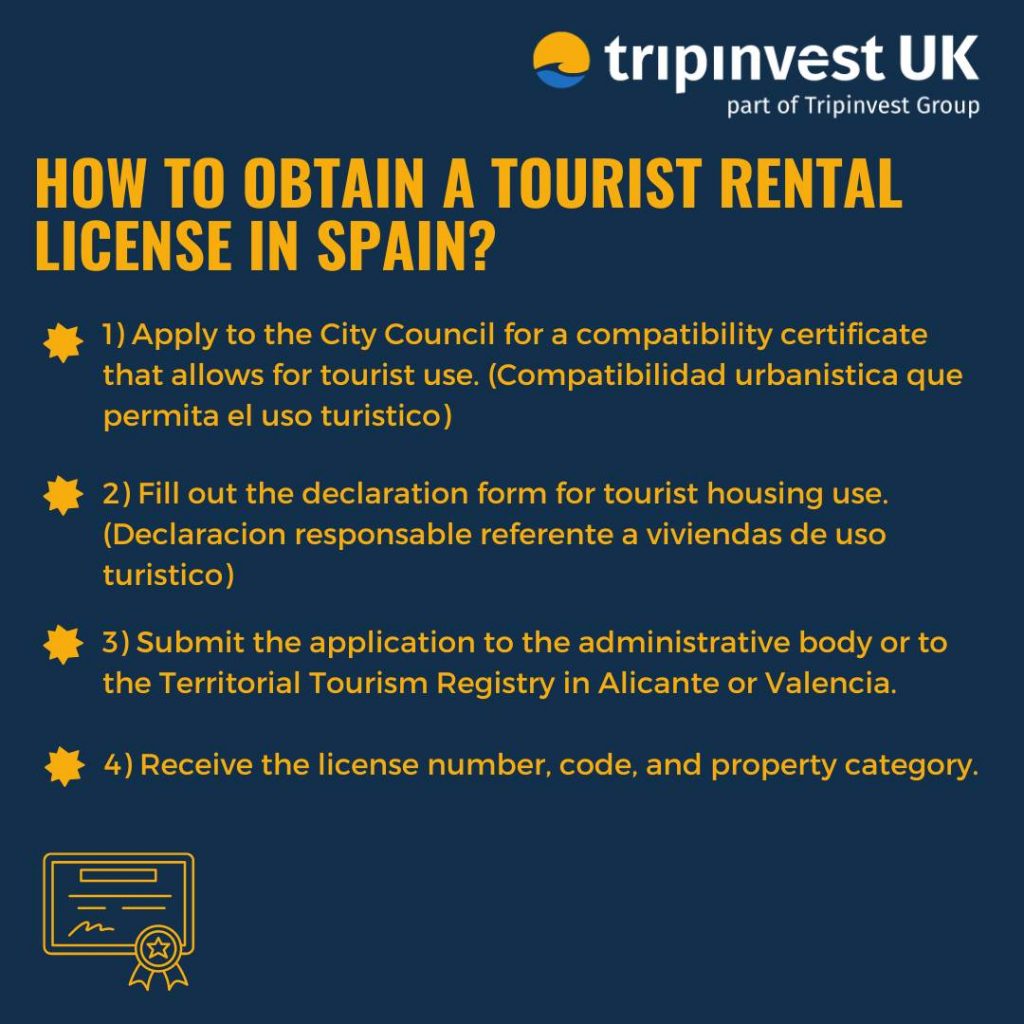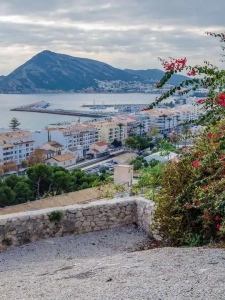Obtaining a tourist license in Spain and renting your property, Are you considering purchasing a property in Spain for short-term vacation rentals? In this article, we will guide you through the process of obtaining the necessary license and explain the conditions you must meet to legally rent out your property.
Holiday Rental Properties In Spain
Holiday rental homes in Spain are becoming increasingly popular. The prospect of earning extra income is so attractive to investors that larger cities have had to implement certain restrictions to limit the number of private renters and the influx of tourists interested in short-term apartment and house rentals.
According to a study conducted by Fotocasa in 2018, the regions that generated the most interest among investors looking for vacation rental properties in Spain were:
- Andalusia (26% of all Holiday homes),
- Catalonia (18% of all Holiday homes)
- Valencia (13% of all vacation homes)
The main reason cited by many investors for such investments is, of course, the opportunity to obtain an additional source of income and the relatively high profitability of this type of rental. Among the most popular types of homes for vacation rentals in Spain are apartments, villas, bungalows, studios, and apartments in traditional Spanish buildings.
Short-Term and Long-Term Property Rentals
When investing in rental properties, you have the option to choose between short-term and long-term rentals. Short-term property rentals, such as obtaining a tourist license in Spain and renting your property, offer greater financial benefits to owners compared to long-term rentals. Tourists visiting Spain are often willing to pay a bit more for a vacation stay in an attractive location. Of course, the key to success lies in choosing the right location for your investment. Properties located in popular tourist resorts can expect high occupancy rates during the holiday season. The potential income from rentals in such areas can be extremely attractive, covering not only the property’s ongoing maintenance costs but also providing additional revenue for the owner.

Who Can Rent Property to Tourists in Spain?
The most important requirements for individuals wishing to rent out their apartment or house to tourists are:
- Possession of a tourist rental license.
- Rental property that meets specific technical requirements.
Engaging in illegal property rentals in Spain can result in fines. It’s worth noting that the conditions for tourist rentals and the process of obtaining a license may vary depending on the region in Spain. In this article, we will focus on the requirements imposed on investors in the Valencian Autonomous Community. Later in the article, you will find specific guidelines on how to obtain a tourist rental permit in this part of Spain.
Places Where Renting Property in Spain Isn’t Easy
As mentioned earlier, some Spanish cities have implemented measures to address the issue of private renters illegally leasing properties through platforms like Airbnb, which leads to significant financial gains. The primary challenge faced by cities such as Barcelona, Madrid, and Palma de Mallorca is the oversaturation of tourists. Enticed by affordable prices for accommodations in private apartments, tourists flock to the most popular Spanish destinations. In 2018 alone, Spain welcomed over 82 million tourists! Many of them find renting a private residence to be a more favorable option compared to staying in a hotel. To address this, popular Spanish cities have implemented various restrictions, including limitations on the number of days for short-term rentals, exclusion of properties in city centers from rental activities, and the requirement to obtain a license.
Different cities and regions in Spain have introduced restrictions on short-term rentals, including the following:
Madrid
In the capital city of Spain, there are regulations regarding the maximum number of days per year that property owners can rent out their property to tourists without a license, which currently stands at a maximum of 90 days. Renting for a longer period requires a special permit. Additionally, it is stipulated that properties designated for vacation rentals must have a separate entrance. This prevents the rental of individual units within apartment buildings or townhouses. Of course, the city authorities have also taken measures to prevent investors from bypassing these restrictions. In such cases, where owners rent out individual units in a multi-unit residential property, Madrid has implemented a provision that subjects these types of properties to the same requirements as hotel establishments.
Barcelona
The regulations regarding vacation rentals in Barcelona are highly restrictive. Property owners must obtain a license and can rent their units for a maximum of 120 days per year. Additionally, tourists who stay in these rentals are obligated to pay a tourist tax. Certain restrictions also apply to platforms that facilitate the booking of apartments or homes for stays in the city. Authorities impose fines on platforms that advertise illegal rental offers.
Barcelona faces ongoing challenges with excessive tourism, leading to the implementation of stringent regulations. In 2014, authorities halted the issuance of licenses for private property rentals to tourists. Additionally, a ban on new hotel construction in the city center and surrounding neighborhoods was implemented. This response highlights the negative impacts of mass tourism on Barcelona, making the city less hospitable for its residents.
The influx of tourists indirectly affects the local real estate market, driving high rental prices. Property owners seek greater financial gains by renting to tourists who are willing to pay a premium. Consequently, some neighborhoods experience depopulation, creating difficulties for Barcelona residents in finding affordable rental properties.
Despite authorities no longer issuing new licenses for tourist rentals, individuals continue to illegally rent out properties. In response, the city authorities have taken various measures to combat these practices. These measures involve increasing the number of personnel responsible for verifying the legality of rentals and establishing a portal for residents to report properties being rented without the necessary permits.
Mallorca
In Majorca, the regulations regarding property rentals vary depending on the specific parts of the island. Renting out your own property requires the appropriate permit, as failure to comply can result in fines for property owners. It’s important to note that vacation properties in this part of Spain can be rented out for a maximum of 60 days per year in typical tourist regions.
As for the capital city of the island, Palma de Mallorca, the situation is slightly different. The city authorities have implemented a complete ban on renting apartments to tourists in the city center. However, property rentals are permitted in suburban areas or near the airport.
Holiday Rentals – Costa Blanca
The considerable influx of holidaymakers poses considerable challenges, and at times, insurmountable obstacles when it comes to acquiring permits for vacation property rentals in the previously mentioned regions of Spain. Prospective investors looking to venture into vacation property rentals should undoubtedly consider the Costa Blanca as an exceptional destination, where the process can be significantly streamlined. Despite its growing popularity among holidaymakers, this region encounters fewer hurdles compared to the resorts mentioned earlier. The reduced density of tourists implies that obtaining a rental license in an appealing location is more straightforward than one might initially assume. To be more specific, we highly recommend exploring the abundant property opportunities in the Valencian Autonomous Community, which encompasses captivating resorts such as Alicante, Benidorm, Calp, and Altea.
How to Obtain a Rental License in Valencia
An investor intending to dedicate a property to short-term tourist rentals must obtain a tourist rental license. Only then will the rental activity be considered legal. It’s important to note that the process of obtaining a rental license may vary depending on whether you want to register as a private renter or a company. If you plan to rent out more than 5 properties, you are required to register as a business. In this article, we will focus on the tourist rental license for individuals. Here is a step-by-step guide to the entire process in the Valencia region on the Costa Blanca.

Step By Step Guide
- To begin, it is necessary to apply to the City Council for a document allowing the rental of the apartment in our building – Compatibilidad urbanística que permita el uso turístico (Urban Compatibility Certificate for Tourist Use).
- Next, you need to complete the Declaración responsable referente a viviendas de uso turístico (Declaration of Responsibility for Tourist Use Housing) form.
- You should submit the application to the administrative body in the province where your property is located or to the Registro Territorial de Turismo (Territorial Tourism Registry) in Alicante or Valencia.
Alternatively, the application can be sent by mail to the following address:
Registro del Servicio Territorial de Turismo Valencia Pl. Alfons el Magnánim 15 46003 Valencia
Registro del Servicio Territorial de Turismo Alicante C/ Churruca 29 03003 Alacant/Alicante
The following documents should be included with the application:
- Copy of identification document.
- Document confirming the right to use the property.
- List of properties intended for tourist rental.
To ensure that all formalities are properly completed, we recommend consulting with us @ Tripinvest UK
4. Once you register the property, the authorities will issue you a license number, assign a location code, and categorize the property accordingly. From this point forward, it is mandatory to use these identifiers in promotional materials posted on booking platforms and other places where you will advertise your rental offer.
Individuals planning to rent out a private property in Spain should also familiarize themselves with the regulations imposed by the specific community of property owners they belong to. This applies to those who wish to rent out an apartment or a unit within a larger residential building or urbanization. Some community associations may prohibit tourist rentals within certain buildings.
In this revised version, I have optimized the text for SEO while incorporating the provided information. Let me know if there are any specific keywords or phrases you would like to target, and I’ll make sure to include them.
What technical requirements must a rental property meet?
It’s important to note that in the Valencia region, there are three types of rental properties for tourists: Standard, Premier, and Superior. Each type corresponds to a different standard of the property in terms of equipment, size, and available amenities.
Let’s explore the specific requirements that rental properties must meet for each standard:
Standard:
- Parking: Not required
- Safe: Not required
- Garden: Not required
- Bathroom/Toilet: Required
- Access to hot water: Required
- Access to telephone or internet: Not required
- Elevator: Required if the unit is on the 4th floor or above
- Evacuation plan: Required (hung on the door of the unit)
- Swimming pool/Beachfront location: Not required
Premier:
- Parking: Required
- Safe: Required
- Garden: Not required
- Bathroom/Toilet: Required
- Access to hot water: Required
- Access to telephone or internet: Not required
- Elevator: Required if the unit is on the 3rd floor or above
- Evacuation plan: Required (hung on the door of the unit)
- Swimming pool/Beachfront location: Required
Superior:
- Parking: Required
- Safe: Required
- Garden: Required
- Bathroom/Toilet: Required
- Access to hot water: Required
- Access to telephone or internet: Required
- Elevator: Required if the unit is on the 2nd floor or above
- Evacuation plan: Required (hung on the door of the unit)
- Swimming pool/Beachfront location: Required
Additionally, individuals renting a property to tourists in Spain should possess an Energy Performance Certificate (EPC). The certificate should be issued by a qualified technician, and it needs to be registered with AVEN – the Valencian Energy Agency.
The property owner must also ensure that they have insurance coverage for the property against theft and various unforeseen circumstances.
Tax on property rental in Spain
Investors who want to generate financial benefits from renting properties in Spain must be aware that such income is subject to taxation. There are two deadlines for paying property rental tax in Spain. Individuals who reside there permanently or spend more than 180 days a year in Spain are required to pay the tax in May. On the other hand, property owners who are not permanent residents pay the tax in December.
Here are the documents that need to be provided to properly file taxes with the Spanish Tax Office:
- National identification document
- Notarial deed of the property
- Property tax (IBI) receipt
- Expenses related to the property rental
- Income obtained from property rental
What rights does the property owner have?
The rights of property owners, as regulated by Spanish laws, encompass various provisions. Firstly, owners have the entitlement to request a security deposit from tenants as a precautionary measure for potential damages to the property or unforeseen additional guests. The maximum amount for the security deposit is set at 250 euros. Moreover, should a guest decide to cancel their reservation, the property owner retains the right to claim a partial or full refund of the prepaid amount. Furthermore, in cases where a guest fails to notify the owner in advance and does not show up at the property, the owner is within their rights to cancel the reservation and withhold any previously paid accommodation fees.
Which type of property to invest in?
Looking to invest in a property in Spain and obtain a tourist license for renting your property? Look no further! Discover the perfect investment opportunity for you in our wide selection of apartments, houses, villas, and other properties. Our expert team is here to guide you through the process, helping you choose the right property type and location to maximize your returns. Don’t miss out on this lucrative investment opportunity. Contact us now to explore the possibilities and find your ideal property for obtaining a tourist license in Spain and renting it out.






